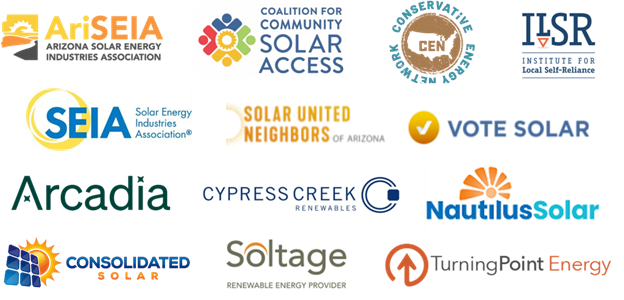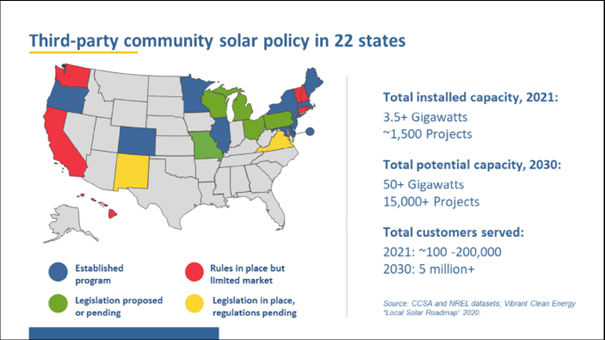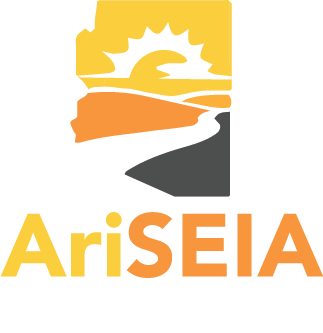|
Arizona Corporation Commission 1200 W. Washington Street Phoenix, AZ 85007 RE: Community Solar, Docket No. E-00000A-22-0103 and APS RES, Docket No. E-01345A-21-0240 Madam Chair, Commissioners, Commission Staff, and Interested Stakeholders, The signatories to this letter — a coalition of solar and storage industry partners, including developers, subscriber acquisition and management firms, and advocacy groups — appreciate the Commission and Staff conducting the working group meetings regarding the implementation of a community solar program in Arizona. We believe that a properly constructed community solar program will provide bill savings to electric utility customers, promote electric grid resiliency, and assist Arizona in its transition to clean energy. We are committed to docketing information that will assist in the Commission’s consideration of a proposal for implementation and we look forward to continued participation and discussion in the working group sessions. We put forward, as Attachment A, this draft program design to aid in the working group discussions and the successful adoption of a community solar program in advance of the November Open Meeting. We additionally put forward, as Attachment B, an assessment regarding the Commission’s authority to implement the community solar program and tariff outside of a rate case. Further, we appreciate the letter filed by the Chairwoman on August 23, 2022 regarding the various models of community solar her office sees as relevant to this proceeding. The undersigned stakeholders plan to file a separate response to that letter as soon as possible with answers to the questions therein that are grounded in the program proposal put forth below. We appreciate the opportunity to address these important concerns. We look forward to continuing to engage in the working group process to develop a successful community solar program in Arizona.
0 Comments
Arizona Corporation Commission
1200 W. Washington Street Phoenix, AZ 85007 RE: Study of Community Solar Value Stack in Arizona - Community Solar (Docket No. E-00000A-22-0103), APS RES (Docket No. E-01345A-21-0240) Madam Chair, Commissioners, Commission Staff, and Interested Stakeholders, The signatories to this letter — a coalition of solar and storage industry partners, including developers, subscriber acquisition and management firms, and advocacy groups — appreciate the Commission and Staff conducting the working group meetings regarding the implementation of a community solar program in Arizona. We believe that a properly constructed community solar program will provide bill savings to electric utility customers, promote electric grid resiliency, and assist Arizona in its transition to clean energy. We are committed to docketing information that will assist in the Commission’s consideration of a proposal for implementation and we look forward to continued participation and discussion in the working group sessions. Attached to this letter is a study completed by The Brattle Group that analyzes the value stack of community solar in Arizona. The Brattle Group is a leading consulting firm that specializes in answering complex economic, finance, and regulatory questions for corporations, law firms, and governments around the world. The value stack of a community solar project represents the costs that would otherwise be borne by ratepayers but that are avoided due to the energy and grid services provided by a community solar project. The community solar value stack consists of three value streams: (1) Avoided Generation, (2) Avoided Transmission and Distribution, and (3) Avoided Emissions. The purpose of this value stack study is to provide the Commission and stakeholders with information to guide discussions on an appropriate bill credit rate and compensation mechanism for the community solar program in Arizona. Brattle will be prepared to present this material and answer questions at the working group session on August 30, 2022. We look forward to additional discussions regarding designing a final bill credit rate, tariff, and compensation mechanism for projects. Arizona Corporation Commission
1200 W. Washington Street Phoenix, AZ 85007 RE: Community Solar, Docket No. E-00000A-22-0103 Madam Chair, Commissioners, Commission Staff, and Interested Stakeholders, The signatories to this letter — a coalition of solar and storage industry partners, including developers, subscriber acquisition and management firms, and advocacy groups — appreciate the Commission and Staff conducting the working group meetings regarding the implementation of a community solar program in Arizona. We believe that a properly constructed community solar program will provide bill savings to electric utility customers, promote electric grid resiliency, and assist Arizona in its transition to clean energy. We are committed to docketing information that will assist in the Commission’s consideration of a proposal for implementation and we look forward to continued participation and discussion in the working group sessions. We were encouraged by the progress made during the Commission’s community solar working group held on August 4, 2022 and appreciate that the next meeting will be a two day working group session held on August 30 and 31. We understand that Staff is still developing the proposed agenda for the August meetings; therefore, we suggest the following topics: bill credit structure and value, eligible subscribers and low- and moderate-income (LMI) subscriber participation, program and project size, project selection, storage, and hosting capacity maps. To the extent that it is helpful to the Staff and other stakeholders, below are potential questions that could be posed for each topic at the next meeting. ● Bill credit structure and value ○ How should the bill credit be structured? ○ Would the resource comparison proxy (RCP) accurately represent the full value of community solar projects? ○ Given the bill credit structure, what is the projected value of the bill credit? ○ What should the term of the bill credit be? ● Eligible subscribers and LMI participation ○ Which customer classes should be eligible for participation in the program? ○ Should there be percentage per-project subscription targets or requirements for certain customer classes? ○ Should there be a required percentage for LMI customer subscription? ○ Should there be a maximum project capacity that “anchor tenants” can subscribe to? ● Program size and project size ○ Should there be a cap on program size? ○ If yes, how should it be constructed? (e.g., percentage of total retail sales vs. number of MW) ○ Should there be a maximum project size or only a requirement that projects connect to the distribution grid? ● Project selection ○ How should projects be selected for participation in the program? (e.g., first-come first-served vs. RFP) ○ What type of project maturity milestones should be required for eligibility in the program, and should those milestones depend on the program size (capped versus uncapped)? ● Storage ○ Should community renewables projects be limited to solar photovoltaic systems, potentially paired with storage? ● Hosting capacity maps ○ Has Arizona Public Service (APS) completed a hosting capacity study and if so, how do the results compare to what would be needed for program implementation? ○ Does APS have hosting capacity maps and if so, how are they to be used by developers? ○ Are there recommended examples of hosting capacity maps in other states? ○ What types of data should be included in hosting capacity maps and how often should they be updated? Further, as was requested at the August 4th working group meeting, we have provided as Attachment A an illustrative example of cash flows for a community solar program, sample or redacted bills as Attachment B from Minnesota and New York, and sample contracts from Nautilus and Arcadia as Attachment C. We appreciate the opportunity to address these important concerns. We look forward to continuing to engage in the working group process to develop a successful community solar program in Arizona. Respectfully, Autumn Johnson Executive Director Arizona Solar Energy Industries Association (520) 240-4757 [email protected] Salar Naini Executive Vice President, Business Development Turning Point (480) 330-1245 [email protected] Justin Biltz Director, Policy & Strategy, Community-Scale Markets Cypress Creek Renewables (330) 515-1564 [email protected] Bret Fanshaw Arizona Program Director | West Region Director Solar United Neighbors (602) 962-0240 [email protected] Angela Navarro Head of State Regulatory Affairs Arcadia (352) 262-8201 [email protected] Kevin Cray Mountain West Regional Director Coalition for Community Solar Access (CCSA) (303) 819-3457 [email protected] Maria McCoy Research Associate, Energy Democracy Institute for Local Self-Reliance (612) 808-0688 [email protected] Sara Birmingham Senior Director of State Affairs Solar Energy Industries Association (415) 385-7240 [email protected] Joy Crossman Director of Development Soltage, LLC (201) 559-6243 [email protected] Kate Bowman Interior West Regulatory Director Vote Solar (703) 674-8637 [email protected] Landon Stevens Director of Policy Conservative Energy Network (480) 338-9767 [email protected] Scott Risley Executive Director of Public Policy Nautilus Solar (928) 925-5972 [email protected] Christopher Mejia Founder Consolidated Solar (717) 884-2204 [email protected] AriSEIA worked with more than 10 other organizations to respond to the Arizona Corporation Commission's Staff's community solar questions. The filing addresses each question, provides examples of community solar programs in other states, and sample consumer disclosure forms. Read the letter and learn more about how community solar would work in Arizona here.
AriSEIA Submits Letter to ACC Indicating Intention to Serve on the Community Solar Working Group5/25/2022 May 25, 2022
Arizona Corporation Commission 1200 W. Washington Street Phoenix, AZ 85007 Re: APS 2022 RES Implementation Plan, Docket No. E-01345A-21-0240 and Generic Community Solar Docket, E-00000A-22-0103 Madam Chair and Commissioners, Vote Solar, Solar United Neighbors (SUN), the Arizona Solar Energy Industries Association (AriSEIA), and the Institute for Local Self-Reliance (ILSR) appreciate the opportunity to respond to the discussion preceding the passage of Commissioner Tovar’s 3rd Revised Amendment #1 during the May 18, 2022 Open Meeting. Our organizations thank the Commissioners for their support of this amendment and we look forward to participating in the community solar working group. We seek to offer clarification regarding the work of our organizations and intent of the national petition mentioned during the Open Meeting. We believe that the decision to remove our organizations from the amendment is based on a misunderstanding of our support for a petition to the Federal Trade Commission (FTC).[1] We joined the petition because it seeks to protect consumers from financial scandals and antitrust violations by utilities. The petition does not question or limit the Commission’s authority to regulate utilities in the state, nor does our support for it implicate the good faith efforts our groups have undertaken to build consensus among the solar industry, the utility, and advocates regarding a community solar program in Arizona. We would be happy to meet with any Commissioners interested in the petition to explain its substance and intent in greater detail. AriSEIA, SUN and Vote Solar all have an established record of engagement at the Commission, where we are committed to working in good faith to support a transition to clean energy in Arizona. Similarly, ILSR maintains a positive record of engagement on regulatory issues around the country. We hope that this letter serves to clarify our commitment to advancing community solar in Arizona through the collaborative process approved by the Commission. We look forward to working with all stakeholders involved in the working group and to the Commission’s consideration of the recommendations that result from the working group in November. Respectfully, Autumn T. Johnson Executive Director Arizona Solar Energy Industries Association (AriSEIA) [email protected] Bret Fanshaw Arizona Program Director & West Region Director Solar United Neighbors (SUN) [email protected] Kate Bowman Interior West Regulatory Director Vote Solar [email protected] John Farrell Co-Director of ILSR & Director, Energy Democracy Initiative Institute for Local Self-Reliance (ILSR) [email protected] [1] FTC Legal Petition and Press Release, available here https://biologicaldiversity.org/w/news/press-releases/egal-petition-seeks-federal-trade-commission-investigation-of-energy-utility-abuses-2022-05-18/.  May 13, 2022 Arizona Corporation Commission 1200 W. Washington Street Phoenix, AZ 85007 RE: Community Solar Support in Docket No. E-01345A-21-0240 Madam Chair and Commissioners, The Arizona Solar Energy Industries Association (AriSEIA) very much supports the Commission in an effort to move forward with community solar. Community solar provides a unique opportunity for residential and small business customers to participate in the clean energy transition when they otherwise would not be able to. Community solar is a useful opportunity for those that cannot utilize rooftop solar for practical or financial reasons to be able to join together in projects that are at strategically valuable locations, still close to distribution opportunities. It also provides a way to utilize otherwise underutilized brownfield and agricultural sites. AriSEIA has many member companies that are very interested in investing in Arizona. Community solar provides another avenue for the solar industry to encourage job creation and economic growth in our state. As noted by the Coalition for Community Solar Access (CCSA), several university studies have been conducted that reflect the job and revenue opportunities for states that adopt community solar policies.[1] Failure to act allows other states, including some of our neighbors, to seize those opportunities from us, including New Mexico, Colorado, and California. Arizona should be a leader in solar in the nation. We encourage the Commission to signal to the industry that Arizona very much wants those jobs and investment dollars. We are eager to participate in the working group and feel confident that collaboration with other organizations, consumer advocates, Staff, and the utility will contribute to a better outcome. While there may not be consensus today on what the outcome of the group should be, Commissioner Kennedy’s Proposed Amendment No. 1 is an especially important step towards creating a thoughtful and workable program.[2] AriSEIA encourages the Commission to utilize the working group to explore all of these numerous benefits, as well as utilize the lessons learned from other states that have already adopted community solar policies. All of the details need not be fleshed out today, as that is the very purpose of the working group. AriSEIA is aware that there are presently two different avenues put forward as to how to commence with community solar in Arizona. We do not feel these opportunities are incompatible with each other. We fully support moving forward with a working group in the Arizona Public Service (APS) Renewable Energy Standard and Tariff (REST) docket, as well as utilizing the new docket for fact finding and programs in other service territories if a REST docket is unavailable. We urge the Commission to move forward with a working group in this docket at the May Open Meeting and recommend that a final vote on the outcome of the working group be scheduled for the October Open Meeting. Respectfully, /s/ Autumn T. Johnson Executive Director AriSEIA (520) 240-4757 [email protected] [1] Coalition for Community Solar Access, May 13, 2022 Letter, available here https://docket.images.azcc.gov/E000019242.pdf. [2] Commissioner Kennedy Proposed Amendment No. 1, available here https://docket.images.azcc.gov/E000018712.pdf?i=1652155834150. |
AriSEIA NewsKeep up with the latest solar energy news! Archives
July 2024
Categories
All
|
NEWS
See what AriSEIA is up to on the policy front.
The Arizona Solar Energy Industries Association (AriSEIA) is a 501(c)(6) non-profit trade association representing the solar, storage, and electrification industry, solar-friendly businesses, and others interested in advancing complementary technologies in Arizona. The group's focus is on education, professionalism and promotion of public policies that support deployment of solar, storage, and electrification technologies and renewable energy job growth and creation. |
FOLLOW Us |
Copyright © 2019 AriSEIA - All Rights Reserved



 RSS Feed
RSS Feed
